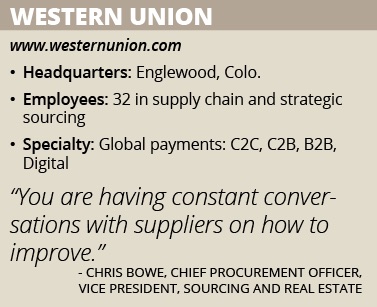Western Union
Western Union is consolidating its supply chain efforts for its 100 far-flung corporate offices worldwide. By Russ Gager
When wiring money worldwide, trust, security, a high number of offices and a reputation well-earned over more than 165 years are important. With half-a-million agent locations serving customers in 200 countries and territories worldwide, the Western Union brand is the gold standard in wiring money. The same is true of Western Union’s Vigo and Orlandi Valuta branded services.
Western Union has more than 100,000 ATMs and kiosks and the capability to send money to more than 1 billion accounts. In 2015, the Western Union Co. completed 262 million consumer-to-consumer transactions worldwide, moving $82 billion of principal between consumers, and 508 million business payments. The company moved more than $150 billion for consumer and business clients in more than 130 currencies during 2015.
As Chief Procurement Officer, vice president of sourcing and real estate for the past year, Chris Bowe manages Western Union’s portfolio of corporate real estate offices in approximately 100 corporate locations in 57 countries and the sourcing of all third-party spend including IT and communications infrastructure. “Our business is to move money, connecting people and businesses,” Bowe summarizes. “We’re always looking for improved ways of sourcing the goods and services that enable that to happen.
“What I’ve been charged with doing and what we’ve been progressing significantly is moving from a more decentralized model with local buying decisions to where we’re pulling together buying and driving the buying decisions in a more centralized fashion,” Bowe continues.
Western Union’s corporate offices have personnel who are part of various corporate departments such as legal, financial, customer service and sales. “The synergy of having both sourcing and real estate under the corporate function is that we are able to address all the local spend driven by those offices,” Bowe says. Employees order office supplies from an online company catalog whose products can be bought at prices Western Union has negotiated.
‘Optimal Footprint’
 The spend on maintenance, repair and operations of the offices and on office supplies and leases is dwarfed by Western Union’s investment in the technology and communications required to send money around the world. “We have significant proprietary platforms we use to enable consumers to send money and businesses to make payments,” Bowe says. “We spend a lot of money with partners on the technology that goes into that infrastructure.”
The spend on maintenance, repair and operations of the offices and on office supplies and leases is dwarfed by Western Union’s investment in the technology and communications required to send money around the world. “We have significant proprietary platforms we use to enable consumers to send money and businesses to make payments,” Bowe says. “We spend a lot of money with partners on the technology that goes into that infrastructure.”
Bowe’s responsibility is to ensure that Western Union’s end-to-end procurement process is effective and that the company’s strategies around leveraging its global buying power are achieving the best value. “That’s basically my mission in a nutshell,” he says.
“We’re always working with our technology and telecommunication providers to be sure we have an optimal footprint with them,” Bowe says. “We have a centralized IT team that we partner with in order to consolidate and leverage our spend on providers of communication software.”
Buying power in telecommunications is consolidated when possible. “For some commodities in telecommunications, we have partners with global presence that we do buy from and leverage that global spend,” Bowe says. “It really depends on what items or services we are buying. For example, we have found that wireless services tend to be more regional buys for us.”
For the large professional services spend that Western Union needs, qualifying companies are examined in detail to determine which one can best meet requirements.
The same is true of the managed services companies that keep the company’s owned and contracted infrastructure and proprietary software platforms running reliably. “We have been very focused and come up with a set of preferred suppliers across multiple categories,” Bowe says. “Our goal here is to build the top quality infrastructure to deliver a positive experience and value to our customer. So we are really very specific about having the best possible partners working with us.”
Regional Approach
Western Union employees speak approximately 75 languages. Bowe’s teams conduct internal company business in English, but individual team members have fluency in multiple languages, which helps the team with its regional approach to purchasing. “Some purchases are very local, and we have to be respectful of that,” Bowe points out. “I’ve organized the supply chain/procurement function so we can maintain that decentralized local priority while having our global strategic objectives being met,” Bowe says. He concentrates his team’s efforts on the hundreds of companies that make up 80 percent of Western Union’s spend around the world. “My philosophy is we should measure the level of supplier management against the level of strategic importance so we can focus where it makes the most value for our customer,” he emphasizes.
The Western Union team evaluates its suppliers regularly. “We’ll have quarterly business reviews of partners to be sure they are delivering at the level we expect them to,” Bowe says. “You are having constant conversations with suppliers on how to improve.”
For the future, Bowe intends to continue to develop and grow high-value suppliers. “My function is to continuously look at our spend and find ways to improve the value,” he says. “I take a global mindset to this approach and making sure we take into account all local requirements across our global footprint in a focused way.”
Bowe attributes his organization’s success to taking “a very disciplined approach to our spend. The success we’ve had is in having that focus and discipline in how we marshal the company’s resources to get our external customer the very best experience.”